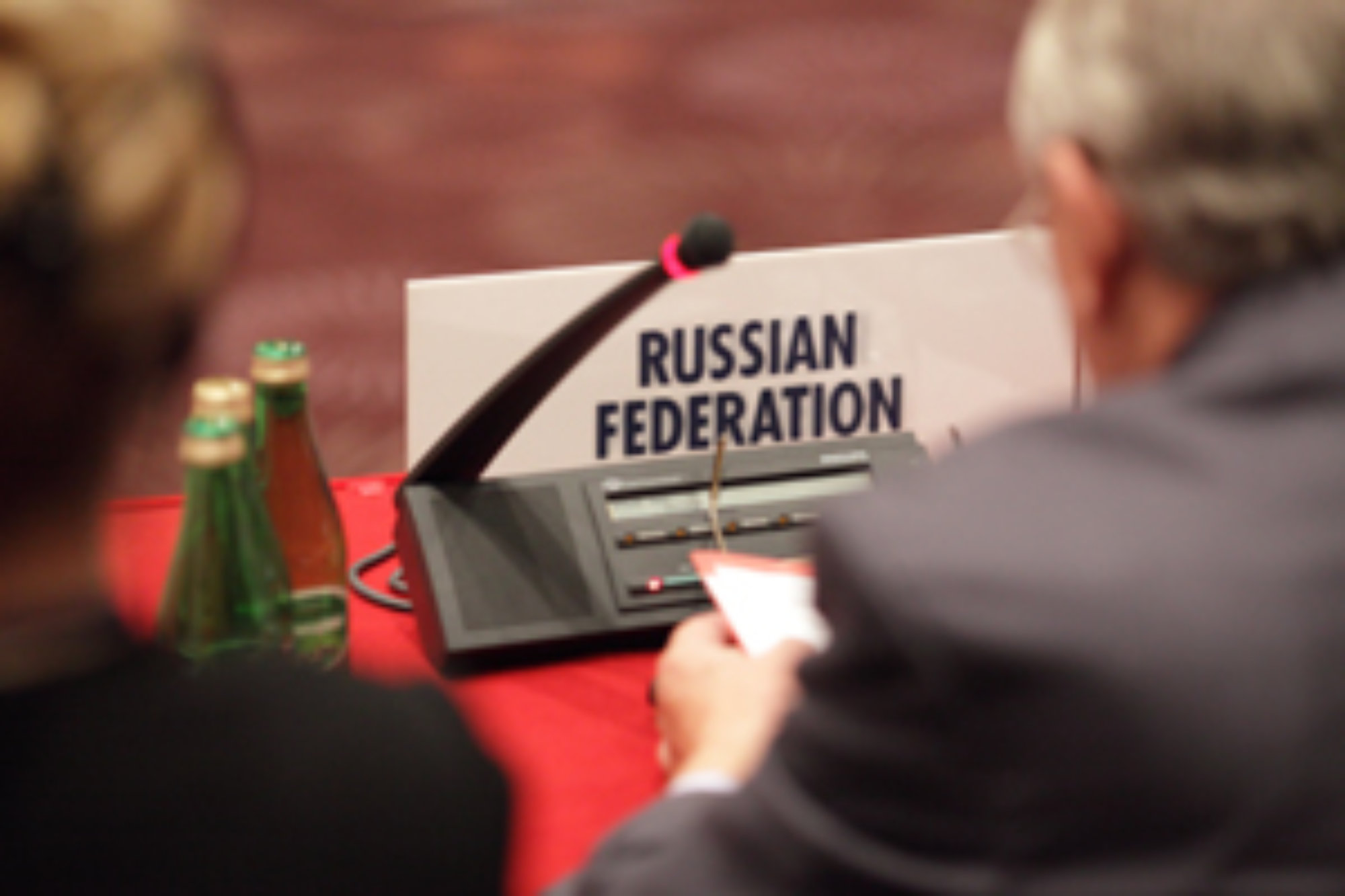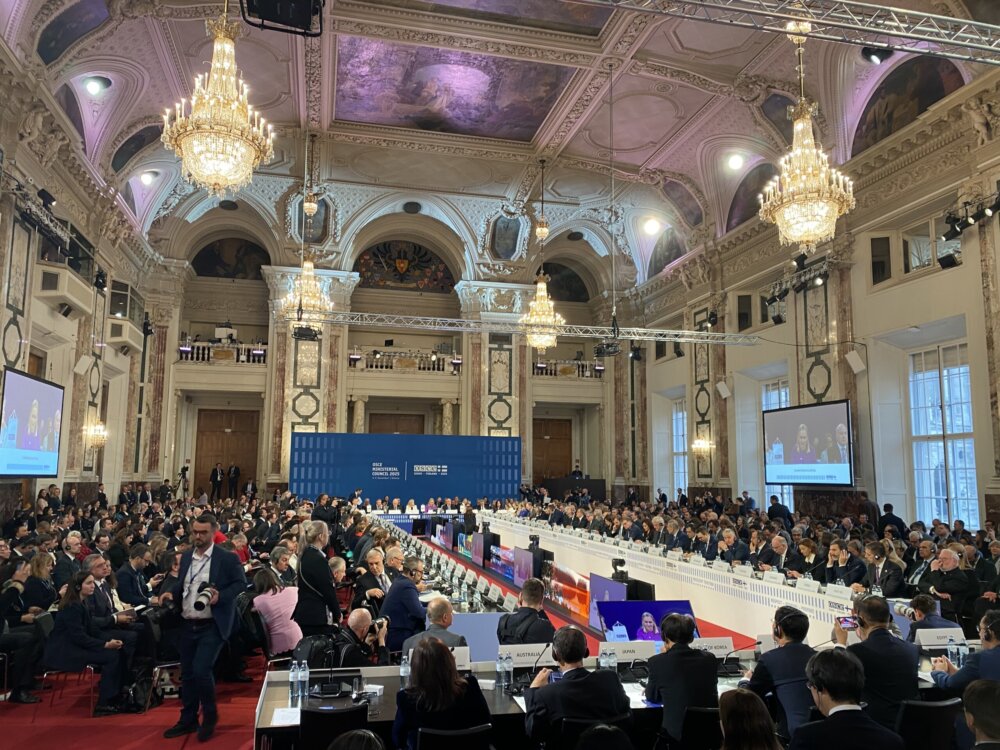OSCE/Piotr Markowski

Options for dealing with Russia in the OSCE
Russia’s war against Ukraine creates a dilemma for participating States in the Organization for Security and Co-operation in Europe (OSCE): the continued functioning of the OSCE depends on the consent of all 57 participating States, yet any decision taken jointly with Russia risks legitimizing Putin’s war at the expense of Ukraine’s sovereignty and territorial integrity.
Why does this matter? Despite the many problems that the OSCE has experienced and that have limited its functioning especially over the last decade-and-a-half, it remains the world’s largest regional security organization by number of states. The OSCE offers governments a permanent forum for dialogue. It mediates in active and frozen conflicts, and it runs field operations in the Western Balkans, Eastern Europe, and Central Asia that support reform in areas such as democratic policing and economic connectivity. OSCE institutions based in Warsaw, Vienna, and The Hague promote human rights, free media, and the protection of national minorities. Moreover, the organization helps participating States to jointly tackle problems such as terrorism, cybercrime, and corruption.
Crucial decisions are due this year. The OSCE’s future depends on at least one: agreement on the annual budget. Despite its small size – less than €140m in 2021, approximately the cost of one fighter jet – the budget has been contested for many years. Without money and staff, the Secretariat in Vienna, the field operations, and institutions such as the Office for Democratic Institutions and Human Rights (ODIHR) will disappear over time. For now, the OSCE survives on monthly allocations based on last year’s budget, but this improvisation will likely only work until the end of the year.
In the current situation, Russia may well oppose a decision on the budget or make its consent dependent on concessions in other areas. Yet, other participating States also have a choice to make: they may principally refuse to adopt decisions together with Russia, or (a lowest common denominator approach) adopt joint decisions that Russia does not reject. Whatever the choices made by any of the 57 participating States, they need to be realistic about the consequences of keeping or abandoning the OSCE.
Option 1: Not taking decisions with Russia anymore
One way of solving the dilemma would be a refusal by other participating States, in cooperation with Ukraine, to take decisions jointly with Russia. The most aggressive version of this policy would be to declare that Russia is suspended from the OSCE. This would mirror Russia’s suspension from the UN Human Rights Council and its expulsion from the Council of Europe.
The OSCE’s predecessor, the Conference on Security and Co-operation in Europe (CSCE), also offers lessons for sanctioning norm violators. In October 1991, in Moscow, CSCE States agreed on allowing missions of independent experts to investigate violations of human dimension commitments, if necessary without the consent of the accused state (the “Moscow Mechanism”). The mechanism has only been used ten times over the past three decades—and was activated most recently by 45 participating States in the context of Russia’s invasion of Ukraine, resulting in a highly critical expert report on violations of international humanitarian law and international human rights law.
Potentially also relevant is the 1992 decision of the CSCE to suspend the then Federal Republic of Yugoslavia (consisting of Serbia and Montenegro) for the aggression against Bosnia-Herzegovina. This was based on a decision at the Prague Council Meeting in January 1992 to allow for political steps to be taken “in the absence of the consent of the State concerned, in cases of clear, gross and uncorrected violations of relevant CSCE commitments.“ Yugoslavia was only readmitted in 2000, after the end of the Milošević regime, and after the Yugoslav government committed to respect OSCE principles and standards.
There is even a provision for consensus-minus-two. In Stockholm in December 1992, the CSCE added provisions to the so-called Valletta Mechanism, to direct two participating States engaged in a dispute to seek conciliation.
Unfortunately, these mechanisms are not a panacea for dealing with Russia now. Consensus-minus-two was never used because the provisions are complicated and politically contested. With regard to the suspension of Belgrade: Yugoslavia at the time had no strong allies and was not a powerful participating State, in contrast to Russia. There were also doubts whether the suspension was legally and politically warranted.
Moreover, the early 1990s were the heydays of the Organization when states created rules that lost traction shortly afterwards. Thus, the 2006 Rules of Procedure above all stress the consensus principle, which goes back to the 1973 Final Recommendations of the Helsinki Consultations. If the West now tried to apply mechanisms limiting the consensus rule, Russia would most likely argue that the West had destroyed the OSCE by violating one of its core principles. Moscow could also be prompted to withdraw from the OSCE itself. As an indication of its insistence on consensus, Russia called the Human Dimension mechanisms “outdated and redundant for the most part” after the recent activation of the Moscow Mechanism.
More important than this formalistic perspective: without Russia, the OSCE would lose much of its purpose. The permanent security dialogue between Western states and Russia is a unique value of the OSCE. To be sure, Russia’s annexation of Crimea and its intervention in the Donbas in 2014 reduced dialogue in the Vienna conference halls to mutual accusations. One of the victims was conventional arms control and military transparency. For example, Russia refused for years to update the 2011 Vienna Document, which provides among other measures for mutual inspections.
Russia’s aggression against Ukraine on 24 February has reinforced the policy of Western participating States and their allies of “no business as usual”, in place since 2014. Nevertheless, even meetings where diplomats ritualistically present antagonistic positions are valuable at a time when there is a serious risk of a war between Russia and NATO states. The original aim of such meetings – to build trust – now seems naive, but simply informing the other side of one’s position helps to channel information to the 57 capitals and avoid misunderstandings that could spiral into nuclear war.
Taking decisions without Russia, and thus effectively suspending Russia from the OSCE, may also not be effective in ensuring the Organization’s survival. Moscow’s allies, above all Belarus and potentially Armenia (which depends on Russia keeping Azerbaijan at bay) and Tajikistan (which has a Russian military base on its territory), could still frustrate decision-making. In addition, should Russia formally leave the OSCE, its allies would likely follow suit, as might other participating States sharing the Kremlin’s concerns about OSCE support to democratization, such as Azerbaijan, Turkmenistan, and Tajikistan. The result would be a rump OSCE. If the nationalist Serbian government joined the Russian camp, the OSCE would lose much of its still significant remit in the Western Balkans, too.
Participating States could also sideline Russia without formally suspending Russia. Delegations could refuse to sit in meetings with Russian diplomats, similar to Ukraine’s decision not to attend any meeting of the Forum for Security Cooperation between April and July when Belarus chairs the Forum. They could also set up alternative meetings where they take decisions without Russia. The Rules of Procedure allow the Chairperson-in-Office, the Chair of the Forum for Security Co-operation, or an executive structure (such as the Secretariat) to organize events without agreement from all participating States. But such events, unless based on a consensus decision, are not official OSCE events, and documents adopted at such events do not count as OSCE documents and therefore lack normative traction.
Hence, there are no tricks for bypassing the consensus rule. Any attempt to do so would risk the survival of the OSCE.
Option 2: Being open to pursuing minimal cooperation
Alternatively, participating States might pursue minimal cooperation with Russia, including by adopting the annual budget. This policy is made easier by the OSCE rule that a decision only requires that no participating State actively opposes the decision. As article 69 of the 1973 Final Recommendations of the Helsinki Consultations states: “Consensus shall be understood to mean the absence of any objection expressed by a Representative and submitted by him as constituting an obstacle to the taking of the decision in question.” Similarly, the 2006 Rules of Procedure allow for a so-called silence procedure for decisions by the Permanent Council, the Forum for Security Co-operation, and the Ministerial Council whereby a decision can be adopted if no participating State expresses an objection to the decision within a pre-determined period of time.
Hence, participating States could adopt a lowest common denominator approach towards Russia: they would be open to adopt decisions that Russia also supports, rather than being against everything Russia supports and refusing to take any decisions with Russia. This approach to critical decisions would potentially keep the OSCE functioning.
A similar approach was recently adopted at the United Nations Security Council when a Presidential Statement was issued by the Council President, Ambassador Leah Thomas-Greenfield of the United States. Merely reminding UN member states of their “obligation to settle their international disputes by peaceful means”, the statement also reflects the potential problems with such an approach in potentially legitimizing Russian aggression or creating a moral equivalence between Russia and Ukraine.
It would therefore be important to minimize any Russian legitimacy gains from such an approach in the OSCE context by delegations walking out when Russian delegates speak (which happened both in the Permanent Council and in the Forum for Security Co-operation), at least when no decisions need to be taken. Moreover, OSCE States can continue condemning Russia’s war during debates in the Permanent Council and the Forum for Security Co-operation, and also issue interpretative statements after making joint decisions. As part of the official record of meetings of the Permanent Council and the Ministerial Council, such statements help opponents of Russia’s war to signal norms-based positions, also to parliaments and the public back home.
The lowest common denominator approach could also be applied to other issues beyond the adoption of the budget. The OSCE still does not have agreement on the Chair-in-Office in 2024 (after Russia, late last year, blocked Estonia’s bid). Moreover, the mandates for OSCE field operations in the Western Balkans, Moldova, and Central Asia need to be renewed by the end of the year. Failing agreement among all 57 participating States, one option would be to fund such missions through extrabudgetary contributions (ExB) that do not require consensus. To be sure, Russia could then rightly argue that these are no longer OSCE activities. Yet, ExB may be a way to buy time.
However, the lowest common denominator may be too small to keep the OSCE going. The mandate of the Project Coordinator in Ukraine, which now provides primarily humanitarian aid in Ukraine’s West, expires at the end of June. Russian agreement to extend the mission is unlikely, given that Moscow pulled the plug on the Russia-based OSCE Border Observation Mission last year and in March this year refused to extend the Special Monitoring Mission in Ukraine (SMM). The OSCE might therefore soon no longer have a presence in Ukraine, despite its contribution to mitigating some of the effects of war.
Hanging on a thread, too, is Europe’s largest human rights conference. Annually organized by ODIHR in Warsaw, the Human Dimension Implementation Meeting was canceled in 2020 because of the COVID-19 pandemic and in 2021 because of Russian opposition. If the meeting does not take place a third time in a row it would probably have to be consigned to the dustbin of history.
The future of ongoing OSCE mediation efforts is unclear, too. The Geneva International Discussions over the conflicts in Georgia (Abkhazia and South Ossetia) are on hold, although the OSCE and EU facilitated Incident Response and Prevention Mechanism in Ergneti has continued to meet regularly. On hold, too, is the Minsk Group, which mediates in the conflict over Nagorno-Karabakh and is co-chaired by France, Russia, and the United States. Even in Transnistria where conflict management has looked most promising over recent years, the OSCE’s role may wane if Russia expands its war to Moldova via Transnistria.
Without agreement on HDIM, a mediation role, and potentially some or all field operations, the OSCE could still survive, even if in a truncated form. But time is running out and as it does, uncertainty will increase: there is no precedent for how the Organization would continue to function without agreement on a budget (needed, at least according to a standard interpretation of the rules, before the end of 2022) and on a Chair for 2024 (needed early in 2023 in order to give the chosen state enough time to prepare). Moreover, the mandate of the current Secretary General – Helga Maria Schmid – expires at the end of 2023. The prospect of a repeat of the leadership crisis of 2020 could be the death knell of the Organization.
Thus, there is no alternative to minimal cooperation with Russia, at least in the form of the lowest common denominator approach to critical decisions. The cost of legitimizing Russian aggression is relatively minimal and outweighed by the ability to retain an organization that can still help to reduce the risk of a wider war.
Being realistic about the consequences
As long as Russia is pursuing an expansionist policy and continues to act as an imperialist and revisionist power, deterrence and defense are reasonable responses. But the Cold War taught us that dialogue on mutual interests, such as preventing avoidable wars, is a vital complement to deterrence and defense.
Yet even the preparedness of participating States to adopt joint decisions with Russia does not guarantee the OSCE’s survival. It also depends on how the war evolves. Any agreement in Vienna is difficult to imagine while major offensives occur, violations of international humanitarian law continue, and Russia threatens a nuclear war.
Agreement also hinges on Poland, which this year holds the OSCE Chair. As primus inter pares, the Chair moderates the political dialogue in Vienna and, together with the Secretary General, leads the day-to-day business of the Organization. Poland thus has the responsibility to keep the OSCE alive and its partners should make it easier for Warsaw to pursue a lowest common denominator approach by supporting Poland in consulting with the Russian delegation to test the ground for consensus decision-making.
Unclear, too, is whether Ukraine will agree to contemplate joint decisions with Russia. Given its reliance on support from Western participating States, Kyiv would be under pressure to follow them in seeking minimal consensus with a Russian regime intent on destroying Ukraine as a state and a nation. In any case, Western participating States, which regularly prepare joint positions in the OSCE after consulting within their EU and NATO caucuses, should include Ukraine in all of their deliberations.
Ultimately, whether the OSCE can continue as a platform for dialogue between East and West, however minimal for the time being, depends on Russia. So far, there are no indications that Russia wants to leave or destroy the OSCE. Moscow benefits from the Organization in terms of legitimacy and information about its perceived adversaries’ positions and activities. But this war has shown that restraint and rational cost-benefit calculations are not the hallmarks of the current Russian regime.
*Cornelius Friesendorf is Head of the Centre for OSCE Research (CORE), Institute for Peace Research and Security Policy at the University of Hamburg (IFSH), Germany.
*Stefan Wolff is Professor of International Security at the University of Birmingham, United Kingdom.



Comments
* Your email address will not be published